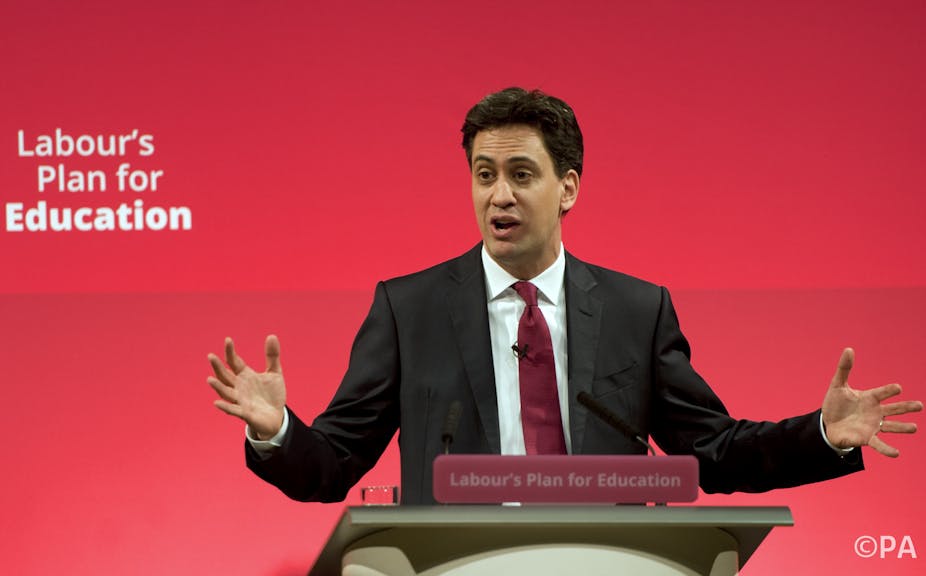Labour’s 2015 manifesto aims to improve life for children and it suggests that one effective means of achieving that aim is to invest in early years’ provision.
The claim is that a child’s language development at the age of two is a strong predictor of reading ability in primary school and later attainment. The evidence for this checks out: early language development is indeed an important precursor to reading and later attainment. Take, for example, vocabulary. At around the age of 18 months, young children’s vocabulary begins to expand rapidly and it is estimated that they learn words at a rate of one every two waking hours; a trend that will continue to adolescence.
Sure Start
Labour says it will “restore the role of Sure Start centres as family hubs”. A recent report from the OECD highlighted the link between young children’s early personal, social and emotional development and later academic attainment. It makes sense to provide the best possible care and educational opportunities in the early years of children’s lives, but do Sure Start centres represent the most effective method? And are they likely to contribute to closing the attainment gap seen between children from disadvantaged backgrounds and those from more affluent environments?
Let’s take a look at recent experience. Following their election in 1997, Labour pledged to improve services, including educational provision, with the aim of reducing the impact of poverty and social deprivation in England. The Sure Start initiative was introduced.
The National Evaluation of Sure Start team did find some positive impacts on a range of factors including three-year-olds’ personal and social development, but there has been criticism of the initiative. Early childhood education experts have stated that:
These interventions have been undertaken in a piecemeal fashion and so far have had only a very partial impact in breaking the link between poverty and poor educational attainment.
In 2011, I analysed the early reading and mathematics development of children starting school between 2001 and 2009, a period that included the introduction and embedding of Sure Start local programmes, and concluded that there were no significant changes.
More recently, my colleagues and I analysed data for groups of children starting school between 2000 and 2006, following them up to the end of primary schools. We concluded:
The gap appears to remain consistent and overall, there is little evidence to suggest that it is closing over time for either Maths or English. On average, children who are entitled to free school meals start school with lower scores in reading and mathematics than their peers and that this trend persists to the end of primary school.
Academics have warned that while interventions might appear to be promising when trialled in optimum environments, it is difficult to bring about effective change when they are scaled up to community-based programmes.
If Labour is to bring about positive change through a revival of Sure Start, serious consideration needs to be taken of the programmes that the centres provide and the strategies to attract the families in most need of the facilities rather than continue to replicate a system that doesn’t have good evidence of impact. A crucial element of success is a high quality, well-planned evaluation programme so that provision can be continuously monitored and improved.
Pupil premium
In education policies released before the full manifesto, Labour has also pledged to continue the early years pupil premium “working with early years settings to ensure it is used effectively” with the aim of helping all children, whatever their background, to be fluent readers by the age of 11.
This should surely be a popular policy but, again, research has shown that it is difficult to raise standards. For example, we reviewed many studies and found that the reading standards of children aged 11 remained almost static over a period of more than 50 years from the 1950s up to when out review was published in 2007.
The Pupil Premium Toolkit, published by the Education Endowment Foundation, reviews the effectiveness of a wide range of educational interventions and provides a really useful evidence base for planning future improvements to education system but we still need to be wary. Small-scale research studies often have a much bigger impact than when a programme is scaled up. Again I would strongly recommend evaluation of impact be built in from the outset rather than spending money and finding out too late that nothing has changed.
The Conversation’s Manifesto Check deploys academic expertise to scrutinise the parties’ plans.

